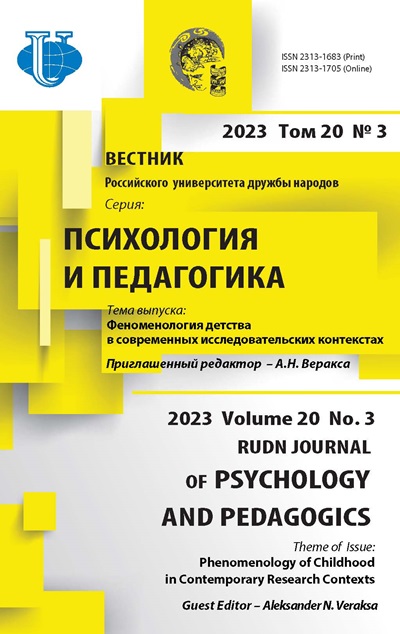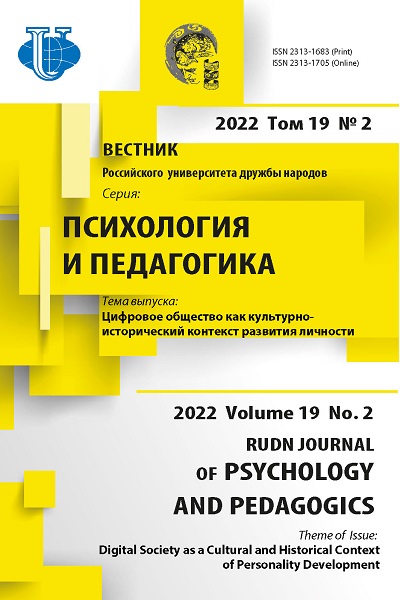Heuristics: Human and Nonhuman
- Authors: Voiskounsky A.E.1
-
Affiliations:
- Lomonosov Moscow State University
- Issue: Vol 19, No 2 (2022): Digital Society as a Cultural and Historical Context of Personality Development
- Pages: 195-208
- Section: PERSONALITY IN THE DIGITAL AGE: DEVELOPMENT, COGNITION, COMMUNICATION
- URL: https://journals.rudn.ru/psychology-pedagogics/article/view/31388
- DOI: https://doi.org/10.22363/2313-1683-2022-19-2-195-208
Cite item
Full Text
Abstract
The problems of artificial intelligence from the very beginning of this applied area of science in the mid-20th century have closely intersected with psychological problems, primarily with the psychology of thinking. As experience shows, not only real developments in artificial intelligence but also the discussed prospects for building its working models largely depend on technological progress in the field of computers and software. The paper discusses the changes in representations of heuristics understood as creative thinking and as techniques or rules that are useful for finding solutions to problems. The following issues are specifically considered: the psychological side of the problems of heuristic programming, the similarities and differences between human and computer heuristics, the probability and possible consequences of the singularity phenomenon (understood as the superiority of artificial intelligence over natural one), including the example of the functioning of the community of professional chess players. It is concluded that the progress of computer models and artificial intelligence systems are promising for the positive transformation of the human psyche.
About the authors
Alexander E. Voiskounsky
Lomonosov Moscow State University
Author for correspondence.
Email: vae-msu@mail.ru
ORCID iD: 0000-0002-5213-1366
Ph.D. in Psychology, is Leading Researcher, Department of General Psychology, Faculty of Psychology
11 Mokhovaya St, bldg 9, Moscow, 125009, Russian FederationReferences
- Alekseev, A.P., & Alekseeva, I.Y. (2022). Natural intelligence in the context of digital transformations. Information Society, (1), 2–8. (In Russ.) https://doi.org/10.52605/16059921_2022_01_02
- Bush, G.Ya. (1977). Fundamentals of heuristics for inventors. Riga: Znanie Publ. (In Russ.)
- Desjarlais, R.R. (2011). Counterplay: An anthropologist at the chessboard. Berkeley, Los Angeles, London: University of California Press.
- Faiola, A., Voiskounsky, A.E., & Bogacheva N.V. (2016). Augmented human beings: Developing cyberconsciousness. Voprosy Filosofii, (3), 147–162. (In Russ.)
- Fine, G.A. (2015). Players and pawns: How chess builds community and culture. Chicago, London: University of Chicago Press.
- Gardner, H. (2008). The five minds for the future. Schools, 5(1–2), 17–24. https://doi.org/10.1086/591814
- Gardner, H. (2015). Thinking of the future. Five types of intelligence leading to success in life. Moscow: Alpina Pablisher. (In Russ.)
- Grinbaum, A. (2017). Scammer machine. How to rid artificial intelligence of evil. Saint Petersburg: Translit Publ. (In Russ.)
- Ilyasov, I.I. (1992). System of heuristic methods for solving problems. Moscow: ROU Publ. (In Russ.)
- Jasper, F., & Ortner, T.M. (2014). The tendency to fall for distracting information while making judgments: Development and validation of the objective heuristic thinking test. Vestnik Novosibirskogo Gosudarstvennogo Universiteta. Seriya: Psikhologiya, 8(2), 5–17. (In Russ.)
- Kahneman, D. (2015). Thinking, fast and slow. Moscow: AST Publ. (In Russ.)
- Kahneman, D., & Tversky, A. (2013). Prospect theory: An analysis of decision under risk. In L.C. MacLean & W.T. Ziemba (Eds.), Handbook of the Fundamentals of Financial Decision Making (part I, pp. 99–127). Singapore: World Scientific Publishing Co. https://doi.org/10.1142/9789814417358_0006
- Kasparov, G. (2018). Human and computer: Look into the future. Moscow: Alpina Publisher. (In Russ.)
- Khutorskoi, A.V. (2003). Didactic heuristics. Theory and technology of creative learning. Moscow: Moscow University Press. (In Russ.)
- Kurzweil, R. (2005). The singularity is near. New York: Viking Books.
- Kurzweil, R. (2012). How to create a mind: The secret of human thought revealed. New York: Viking Books.
- Lakatos, I. (1976). Falsification and the methodology of scientific research programmes. In S.G. Harding (Ed.), Can Theories Be Refuted? (pp. 205–259). Dordrecht: Springer. https://doi.org/10.1007/978-94-010-1863-0_14
- Lakatos, I. (2003). Methodology of research programs. Moscow: ACT Publ., Ermak Publ. (In Russ.)
- Miller, G.A., Galanter, E., & Pribram, K.H. (1965). Plans and structure of behavior. Moscow: Progress Publ. (In Russ.)
- Newell, A., & Simon, H. (1965). Imitation of human thinking with help of computer. In A.M. Matyushkin (Ed.), Psychology of Thinking (pp. 457–474). Moscow: Progress Publ. (In Russ.)
- Newell, A., & Simon, H. (1967). GPS as program that simulates process of human thinking. In E. Feigenbaum & Dzh. Feldman (Eds.), Computing Machines and Thinking (pp. 296–299). Moscow: Mir Publ. (In Russ.)
- Newell, A., Show, J., & Saimon, H. (1980). Modeling of human thinking with the help of computers. In Yu.B. Gippenreiter & V.V. Petukhov (Eds.), Reader in General Psychology: Psychology of Thinking (pp. 105–118). Moscow: Moscow University Press. (In Russ.)
- Polya, G. (1975). Mathematics and plausible reasoning. Moscow: Nauka Publ. (In Russ.)
- Polya, G. (1981). Mathematical discovery: On understanding, learning, and teaching problem solving. Combined edition. New York: John Wiley & Sons.
- Pushkin, V.N. (1967). Heuristics: Science of creative thinking. Moscow: Politizdat Publ. (In Russ.)
- Shanakhan, M. (2017). Technological singularity. Moscow: Tochka Publ., Alpina Pablisher. (In Russ.)
- Silver, D., Hubert, T., Schrittwieser, J., Antonoglou, I., Lai, M., Guez, A., Lanctot, M., Sifre, L., Kumaran, D., Graepel, T., Lillicrap, T., Simonyan, K., & Hassabis, D. (2018). A general reinforcement learning algorithm that masters chess, shogi, and Go through self-play. Science, 362(6419), 1140–1144. https://doi.org/10.1126/science.aar6404
- Sokolov, I.A. (2019). Theory and practice in artificial intelligence. Vestnik Rossijskoj Akademii Nauk, 89(4), 365–370. (In Russ.) https://doi.org/10.31857/S0869-5873894365-370
- Spiridonov, V.F. (2000). Evristiki tvorcheskogo myshleniya. Moscow: RSUH Publ. (In Russ.)
- Sultanova, L.B. (2009). Phenomenon of implicit knowledge in mathematics. Vestnik Bashkirskogo Universiteta, 14(3–1), 1200–1204. (In Russ.)
- Tikhomirov, O.K. (1971). Heuristic programming and psychology of creative thinking. In M.G. Yaroshevskii (Ed.), Problems of Scientific Creativity in Contemporary Psychology (pp. 265–307). Moscow: Nauka Publ. (In Russ.)
- Tikhomirov, O.K. (1976). Philosophical and psychological problems of “artificial intelligence.” In O.K. Tikhomirov (Ed.), Artificial Intelligence and Psychology (pp. 8–40). Moscow: Nauka Publ. (In Russ.)
- Tikhomirov, O.K., & Poznyanskaya, E.D. (1966). The study of visual search as path to the analysis of heuristics. Voprosy Psychologii, (4), 39–51. (In Russ.)
- Ulybina, E.V. (2001). Everyday consciousness: Structure and functions. Moscow: Smysl Publ. (In Russ.)
- Vasyukova, E.E. (2020). Heuristics of thinking. Psychology of Cognitive Processes: Conference Proceedings (pp. 129–142). Smolensk: Smolensk State University Publ. (In Russ.)
- Vinge, V. (2008). Signs of the singularity. IEEE Spectrum, 45(6), 76–82. https://doi.org/10.1109/mspec.2008.4531467
- Vinge, V. (2019). The coming technological singularity what if the singularity does not happen? The cookie monster. Moscow: AST Publ. (In Russ.)
- Voiskounsky, A.E. Psychology and artificial intelligence: A new stage of long-time interaction. In V.V. Znakov & A.L. Zhuravlev (Eds.), Psychology of a Person as a Subject of Knowledge, Communication and Activity (pp. 2094–2101). Moscow: Institute of Psychology of the Russian Academy of Sciences Publ. (In Russ.)
- Zinchenko, Yu.P., Eskov, V.M., Filatov, M.A., & Grigorieva, S.V. (2018). Psychology of heuristic and models of heuristic activity of brain. Complexity. Mind. Postnonclassic, (3), 73–84. (In Russ.) https://doi.org/10.12737/article_5c0634a8d68fa5.04729557
















